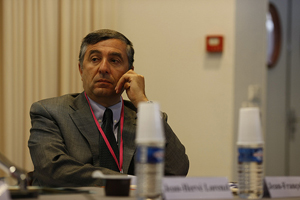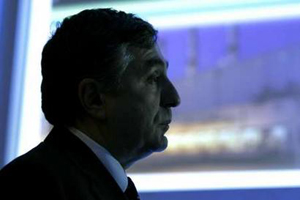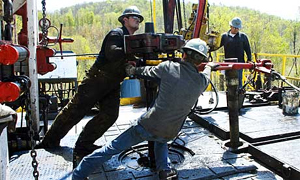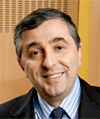"Shale gas will not be as important in Europe as in the US"
on
"Shale gas will not be as important in Europe as in the US"
Eurogas, the European association for the natural gas industry, does not believe that the role of "unconventional gas" will become as important in Europe as in the US, at least not in the short to medium term. For the foreseeable future, Eurogas expects that developing new gas supply routes - such as South Stream and Nabucco - and new supply sources, e.g. in the Caspian region, the Middle East and North Africa - will make a more important contribution to Europe's security of energy supply than the development of domestic unconventional gas resources. This picture emerges from an in-depth interview that European Energy Review held with Jean-François Cirelli, President of Eurogas and President of French energy company GDF-Suez, in combination with a background interview with Margot Loudon, Deputy Secretary-General of Eurogas.
 |
| ‘We are still a long, long way from a smart grid – in terms of investments, costs, delivery' (photo: MEDEF) |
The development of shale gas in Europe is facing much stronger opposition than it did in the US. The French government has placed a moratorium on shale gas activities. In Germany several initiatives have been stalled because of local opposition. In the European Parliament the Alliance of the Greens have recently also pleaded for a moratorium. Although Cirelli does believe that the development of unconventional gas in the US and other parts of the world will make a major difference in the world energy situation, he notes that the situation in Europe is different from that in the US. He cites the higher density of population in Europe, differences in mineral law and in particular stringent environmental legislation on water quality. ‘We do not think the role of unconventional gas in Europe will be as important as in the US – as long as we have affordable conventional gas supplies from our trading partners’, he says.
Although Eurogas broadly supports the development of unconventional gas in Europe, it is not actively lobbying for it. ‘We encourage the exploration of unconventional gas in Europe. At the same time we emphasize that environmental legislation has to be observed’, says Cirelli.
The revision of nuclear energy policy underway in some European countries in the wake of the Fukushima accident could have a major impact on the European gas industry, the Eurogas President notes. ‘Any significant change in nuclear power policies is going to have big implications for gas worldwide as well as in Europe’, says Cirelli. ‘If we are going to have a nuclear rethink in Europe, it makes sense to have a broad dialogue with the gas industry.’
Eurogas warns that it is an illusion to believe that our energy supply can be met solely with renewable energy and accompanying investments in the modernisation of the electricity grids. ‘In the short term, gas presents a quick and competitive solution for a low-carbon energy mix’, says Cirelli. ‘But in the long term gas will also continue to be needed, perhaps in combination with carbon capture and storage.’ He adds that ‘we are a long, long way from a smart grid in Europe – in terms of investments, costs and delivery.’
European Energy Review spoke with Cirelli at the offices of Eurogas in Brussels, where the French businessman and former advisor of the French government has been in office since June 2010.
Mr. Cirelli, the EU Heads of State have said at their special energy council in February that the internal energy market must be completed in 2014. You have been quoted as saying, ‘Brussels has a highly theoretical vision of the market. We need a break from regulation.’ Are you satisfied with the way the internal energy market is developing?
No mistake: we are in favour of the internal market. We believe a competitive integrated European energy market will be in everyone’s interest, both consumers and producers. And we believe we have
| We are concerned when we hear Energy Commissioner Oettinger say that more new regulation is needed to complete the market |
Can you give examples of what you mean by over-regulation?
We have had three Energy Directives in 13 years. There are 31 regulatory bodies in Europe, which have 31 different views about how the market should be organised. European regulators are now discussing with us a Gas Target Model that could tell us in detail how we should offer our products and how we should do business. When we protest against some proposals, we are often being accused of trying to protect our so-called privileges. But that’s not the case. We just want the market to decide how gas will flow in Europe. We are concerned when we hear Energy Commissioner Oettinger say that more new regulation is needed to complete the market. We wonder, will we get more freedom to act in future, as was the idea behind liberalisation, or will everything be totally regulated?
So at what stage are we in the completion of the internal energy market in your view?
It depends on what you call the market. A lot has been achieved already, especially in the networks. It is already much easier for gas to flow from east to west and now also from west to east. But there are still two missing pieces. First it is important to ensure that sufficient investments will be made in the gas sector in the coming years. We know that huge investments are needed. But what incentives do investors have to put their money in the gas market when they are not certain where regulations will go, and when they are not sure what energy mix the EU is driving at? All this creates uncertainty which hampers investments and thereby the functioning of the market.
Secondly, we should not forget that the bulk of our gas supplies comes from outside of the EU – in particular from Russia, Norway and Algeria. So we have an internal market, and companies certainly
| What incentives do investors have to put their money in the gas market when they are not certain where regulations will go, and when they are not sure what energy mix the EU is driving at? |
If you say that the bulk of our gas supplies comes from outside the EU, what does this imply for EU energy policy?
It means that we have to pursue diversification of supply and diversification of routes. It is very important to develop the Southern Gas Corridor and have gas coming from Central Asia.
Is this something that you think the European Commission should be doing or is it primarily a task for market parties?
This is primarily a task for market parties. The Commission and Member State governments should facilitate dialogue with producing and transit countries and encourage the right legal frameworks. But it is companies that are taking risks and pursuing commercial projects.
But are you aligned with the Commission on this? Mr Barroso, the President, and Energy Commissioner Oettinger went to Azerbaijan in January and signed a Joint Declaration with the government of Azerbaijan, apparently to boost the prospects of the Nabucco pipeline project. Is this what the Commission should be doing?
As Eurogas we did not take a position on this. There are different views among our members on what is needed to facilitate their interest. We didn’t know about in advance, either.
What about the Caspian Development Corporation (CDC), the Commission’s plan to set up a collective purchasing agency for buying gas in the Caspian region. Is this something that the Commission should be taking the lead in? Do you agree with the idea of collective buying of gas?
Eurogas was an observer in the steering committee that prepared the final advice on the CDC Report, but other than having commented on the methodological approach we do not take a stand on the CDC as such. That is up to our members individually. The CDC Committee has been wound up now and we understand the European Commission is going to issue a call for interest – which means that companies that want to get involved in the consortium can say so. So it’s moved on to a different stage now. From what was said in the last steering committee the government of Turkmenistan is supportive of the idea. The question is what form a CDC might take, if it gets off the ground. Whatever form it will take, we do hope that it will be aligned with the interests of the companies that are active in the region.
But doesn’t the idea of collective buying go against market principles? Isn’t it a major interference in the market?
We would be concerned if that were the case. But the Commission so far has been sensitive to this possibility. We will have to see how it works out. It is a new sort of vehicle. We have to consider what implications there could be for the future. That has never been quite clear from the Commission’s approach. Besides, the Commission has never clarified the competition aspects of this initiative.
What do you think of EU-Russian relations at the moment? Do you believe Gazprom is being treated fairly by EU energy legislation?
 |
| 'We fear that liberalisation does not mean liberalisation anymore but over-regulation' (photo: Reuters) |
Do you believe there is any chance of a repeat of earlier Russians gas crises? If so, are Eastern European countries better prepared now than in the past?
Lessons were learned from the January 2009 supply problems. These problems are unlikely to be repeated. The Regulation on Security of Gas Supply has introduced measures to ensure that Europe
| How do you compete when 80% of your supply comes from three outside suppliers? |
How do you see the European gas market developing? Is there a future for long-term oil-indexed contracts?
We are facing a real problem here. Most of our members are willing to maintain oil-linked long-term contracts. But we have to settle the present difficulties. Right now there are two gas prices, one on the spot market, one on the oil-indexed contracts. If we can solve this problem, if we can adapt prices, oil-linked contracts will be here to stay. Otherwise we will face a lot of difficulties over this.
Some market watchers believe that a competitive gas market should look like something that exists in the US, i.e. dominated by spot trade rather than long-term contracts.
The US gas market has a different underlying structure than the European one. It is based on domestic supplies. We come from a different direction, that’s why we have a different approach. We will see more
| The Caspian Development Corporation is a new sort of vehicle. We have to consider what implications there could be for the future |
How do you see unconventional gas developing in the world and in Europe?
Development of unconventional gas reserves has the potential to boost the availability of gas worldwide. We used to have enough gas for 60 years, now it’s more than two centuries. In North America shale gas production has become very important and has contributed to a significant change of the market, by turning the US from a net importer to self-sufficiency. However we do not think that the role of unconventional gas in Europe will be as important as in the US—as long as we have affordable conventional gas supplies from our trading partners. Within Europe, there are potential sites, and there would be advantages in exploring them, to see how productive and cost-competitive these might be, subject to the rigorous environmental protection already in place.
Is the development of unconventional gas undermining the profitability of investments in gas production and pipelines, such as South Stream? Does it make the need for a Southern Gas Corridor superfluous?
As I said, the potential of unconventional gas in Europe is not likely to be as important. It is not yet known and will take time to come onstream. As we expect demand for natural gas to continue growing in the future, all new gas is needed. No, as I mentioned, investment in diversified supply routes is essential.
There is growing opposition to unconventional gas. What should happen on the regulatory front to make development of unconventional gas possible in Europe?
 |
| Fracking natural gas (photo: PSFK) |
Are you lobbying with the EU institutions for unconventional gas?
Well, Eurogas represents midstream companies mostly. We are cooperating with the international oil and gas producers association OGP to make the case for unconventional gas.
But surely this is crucial to midstream companies too?
Yes, that’s why we encourage the exploration of unconventional gas. At the same time we are saying that the environmental legislation has to be observed. We increasingly address the issue of unconventional gas and are monitoring developments but we are not currently lobbying hard.
Do you think that production of unconventional gas may have negative environmental effects?
Like other energy projects it will have an environmental impact. Here in Europe, there is a framework in place to protect the interests and welfare of local communities.
For the international oil companies, like Shell, BP, Total and ExxonMobil, gas is rapidly becoming more important, perhaps even more important than oil. How does this impact the midstream energy companies in Europe like GDF Suez, Eon, RWE and Enel? And how does it impact the work of Eurogas?
BP, Shell and Total are members of Eurogas. They have brought a new dynamism to our work. They are large producers and when they take major investment decisions they have to be sure that the demand will be there in future. They share concerns that the current political declarations at EU level tend to
| Most of our members are willing to maintain oil-linked long-term contracts. But we have to settle the present difficulties |
But isn’t it implied in the concept of a transition or bridging fuel – as gas is often described – that at a certain point it will become less important?
We don’t use those words anymore. We see a very positive long-term future for gas. And we want to change the mental set of people in that direction.
According to the decarbonisation roadmap of the European Commission, by 2050 virtually the entire power sector must be decarbonised. What role will there be for gas then?
First of all, this roadmap was produced by the Directorate-General of Climate Action. DG Energy is also working on a roadmap that will come out after the summer. It is not yet clear what this will look like. But we may need to consider at what point some form of carbon capture and storage could be introduced for gas. It is still early for that. Until 2030 the best solution is to change from coal-fired to gas-fired power. After 2030 it is obvious that we will need new technologies to achieve these objectives, including perhaps some form of CCS for gas.
How will the accident at Fukushima impact the role of gas?
It has been a terrible tragedy in Japan. The nuclear industry will
| The international oil companies are concerned that the current political declarations at EU level tend to underestimate the role of gas after 2030, which puts their major investment plans into question |
Do you think this will impact EU energy policy?
Well, if there is going to be a nuclear rethink, it is necessary to sit down again and have a dialogue on this with the gas industry. It would also tie in with the 2050 roadmap. The direction member states are going on nuclear will have big implications for gas.
Some say the gap can be filled by renewables.
Renewables will have a big part to play in the route to a lower carbon energy mix. But the key renewables offer variable production. That is, the wind will not always blow or the sun shine when we need it. Also the grid needs to be expanded and modernised to accommodate for much more renewable energy production. We are still a long, long way from a smart grid – in terms of investments, costs, delivery. And even if you decide to focus on renewables and smart grids, you will still need gas which offers the most cost-effective and efficient back-up to this renewable based intermittent production.
|
Who is Jean-François Cirelli?
In 1995, he was named economic counselor to the President of the French Republic (Jacques Chirac), a position he held until 2002. In 2002, Jean-François Cirelli was appointed Deputy Chief of Staff to the French Prime Minister (Jean-Pierre Raffarin). He was primarily in charge of economic, industrial and labor issues. In 2004, he was named Chairman and Chief Executive Officer of Gaz de France. Since July 2008, he has been Vice Chairman and President of GDF SUEZ. He is also Chairman of the Board of Directors of Electrabel, Board Member of SUEZ Environnement and Supervisory Board Member of Vallourec. He has been President of Eurogas since June 11, 2010. He is married and the father of two children. He is a “Chevalier de la Légion d'Honneur”. |


 Jean-François Cirelli was born on July 9, 1958, in Chambéry (France). He is a graduate of the Institut d'Études Politiques de Paris and the Ecole Nationale d’Administration (1983-1985). He also has a degree in law. He began his professional career in 1985 when he went to work for the Treasury division of the French Ministry of the Economy and Finances. He was successively in charge of housing policy, the General Secretariat of the Paris Club (rescheduling of sovereign debt) and the regulation of financial markets. He was also an alternate director for France at the IMF.
Jean-François Cirelli was born on July 9, 1958, in Chambéry (France). He is a graduate of the Institut d'Études Politiques de Paris and the Ecole Nationale d’Administration (1983-1985). He also has a degree in law. He began his professional career in 1985 when he went to work for the Treasury division of the French Ministry of the Economy and Finances. He was successively in charge of housing policy, the General Secretariat of the Paris Club (rescheduling of sovereign debt) and the regulation of financial markets. He was also an alternate director for France at the IMF.
Discussion (0 comments)